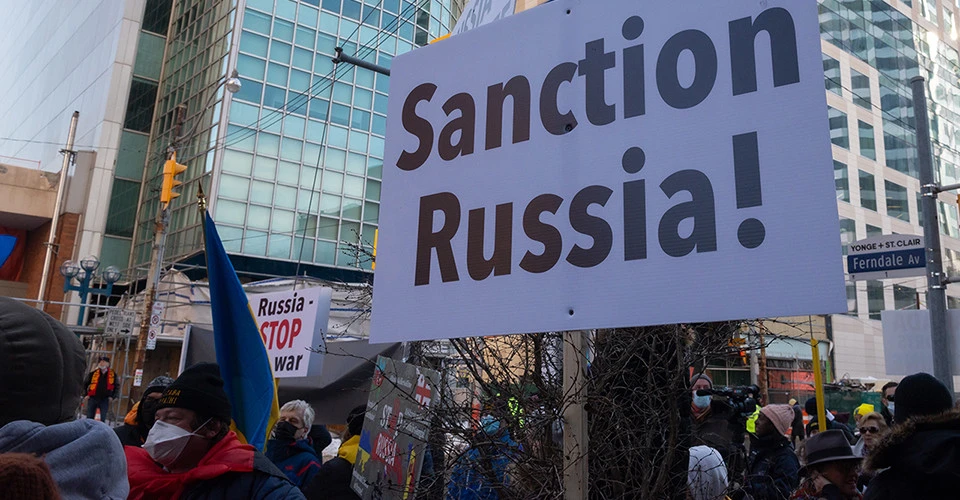
Are sanctions on Russia for war against Ukraine working? Debate intensifies with Trump
The president-elect has pledged to limit the use of sanctions while committing to end the war in Ukraine, raising concerns about their effectiveness once again
The New York Times explains that since Russia's invasion of Ukraine in 2022, thousands of sanctions have been imposed on Russian banks, businesses, and individuals. With President-elect Donald Trump set to take office, the effectiveness and future of these sanctions are set to face renewed scrutiny.
Trump has expressed a desire to minimize the use of sanctions and promised a shift in U.S. policy toward Ukraine, vowing to end the war in one day. Experts believe sanctions and military aid will likely become key bargaining chips in any negotiations.
How significant will the sanctions be under Trump's control? The answer is hotly debated.
Early predictions that sanctions would collapse Putin's regime or devastate the ruble proved incorrect. Putin remains in power, and his forces continue to inflict heavy damage on Ukraine and make gains on the battlefield.
Sergei Guriev, a Russian economist and former resident, stated that the belief that sanctions could quickly end the war was more hopeful than realistic. He suggested a better measure of success is whether sanctions have hindered Moscow's ability to wage war effectively, and many analysts, including Guriev, argue that they have.
After the invasion of Ukraine, the U.S., Europe, and allies quickly restricted Russia’s access to global finance and the U.S. dollar, limiting its ability to sell oil. Western banks froze over $300 billion in Russian assets, and governments banned the trade of various goods, including advanced weaponry.
Europe, which had relied on Russia for 40% of its imported gas, began reducing its dependence. Russia could sell even less energy to Europe after Ukraine refused to renew an agreement for the transit of Russian gas through its pipeline.
“Imagine a world where sanctions were not introduced,” Mr. Guriev said. "A world where Russia’s foreign commerce was not severely limited and it had access to all of its frozen foreign reserves."
“It’s very clear that sanctions did cause problems for Putin, did reduce the amount of resources in his pocket and, therefore, saved lives in Ukraine,” he said. Without them, he added, Russia might have even won the war by now.
Russia's economy has been squeezed, with inflation driving interest rates to 21%. Despite heavy war spending, economic growth is slowing, and many products are either unavailable, overpriced, or replaced by inferior substitutes.
When Trump sits down to negotiate with Putin, sanctions will be “an extraordinarily valuable chip,” said Elina Ribakova, vice president for foreign policy at the Kyiv School of Economics and a nonresident scholar at the Peterson Institute for International Economics, a Washington think tank.
The most effective sanctions have targeted the global financial system, where the U.S. holds unique power. With the U.S. dollar as the universal currency, American banks control transactions, giving Washington significant leverage. By cutting off Russia’s access and threatening global banks, including in China, the U.S. has created a risk few institutions are willing to take.
Russia's removal from SWIFT, the international payment system, has significantly raised the cost, complexity, and time of global transactions, affecting everything from pharmaceuticals and machinery to oil and fertilizer sales.
“It really removes the capacity for any effective payment system,” said Andrew Shoyer, a partner at the law firm Sidley Austin who advises companies on compliance with sanctions.
While sanctions have had more impact than expected, they have fallen short of many hopes. Russia, with help from China, mitigated their effects by expanding trade, exploiting loopholes, and evading laws. China and India, for example, boosted Russia’s economy by purchasing oil, while China supplied essential materials for the war.
Western goods with both civilian and military uses have reached Russia through non-sanctioned countries like Turkey and the UAE. Critics argue that Western nations didn't act quickly or decisively enough to tighten sanctions on Russia. Concerns about energy supply shortages and rising oil prices led the U.S. and Europe to ease restrictions on Russian fuel exports.
The shift from broad European sanctions on Russian oil to a price cap allowed Russia to keep earning significant revenues, funding its war against Ukraine. Over time, Russia created a shadow fleet to bypass sanctions on oil transport. The EU also continues to buy nearly 50% of Russia’s liquefied natural gas exports.
Jeffrey Schott from the Peterson Institute stated that Moscow was able to sell too much gas and oil at high prices, making sanctions less effective. “Sanctions have been applied with one arm tied behind your back,” he said.
He and other critics argue that the piecemeal nature of the sanctions and weak enforcement have allowed Russia to avoid a tighter economic squeeze.
Even the most valuable sanctions may not be enough to convince Putin to agree to a settlement acceptable to Ukraine and its European allies. Some analysts suggest that the fall of Syria's President Bashar al-Assad could lead Putin to take a harder stance in Ukraine. Ultimately, the true value of sanctions as a bargaining chip depends on Putin's decision.
- News












































